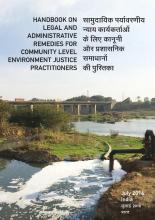Land Library
Welcome to the Land Portal Library. Explore our vast collection of open-access resources (over 74,000) including reports, journal articles, research papers, peer-reviewed publications, legal documents, videos and much more.
/ library resources
Showing items 1 through 9 of 29.This report produced by Centre for Policy Research (CPR) a comprehensive and systematic study of Supreme Court cases on land acquisition from 1950- 2016 and examined particular conflicts involving major dams, special economic zones, housing complexes and industrial projects.
The handbook does not specifically list judicial and court related remedies to any of these problems.
This monitoring framework prepared by Center for Land Governance, NRMC, Bhubaneswar with the support of The World Bank, New Delhi which envisages on reliable and accessible appropriate data set, well laid out procedure to calculate and report Women Land Rights (WLR) indicators acro
This report is in pursuance of the communication of the NITI Aayog, Govt. of India, vide order No.
This report presents the results of a small scale household survey that was conducted in May
2015 to assess the extent to which rural Rwandan citizens are vulnerable or resilient to
environmental, market and land tenure risks and the level they understand the laws and rights
This research, entitled "The Impact of Gendered Legal Rights to Land on the Prevalence and Nature of Intra- and Inter-Household Disputes" set out to interrogate the changing landscape of gendered land rights in Rwanda, and to examine the impact of the statutory changes introduced by laws governin
Rwanda has nearly 280,000 hectares of wetlands, almost 11% of the country’s total
area.1 These wetlands provide critical habitats for wildlife and biodiversity, maintain
important hydrologic processes that help to clean and protect ground and surface
Before 1999, land rights in Rwanda were governed by three regimes: customary
(traditional) law, colonial laws still in effect, and laws enacted after independence. In each of
these, men were privileged in ownership and control of land whereas women were excluded
Over the last decade, the Government of Rwanda (GoR) has engaged in reforming the land sector through formulation and enactment of an enabling legal framework, establishment of land administration institutions, and land tenure regularization.






